HANDOUT 9 French education system
part II. Post secondary education.
See Handout 9 I :
French education system part I.
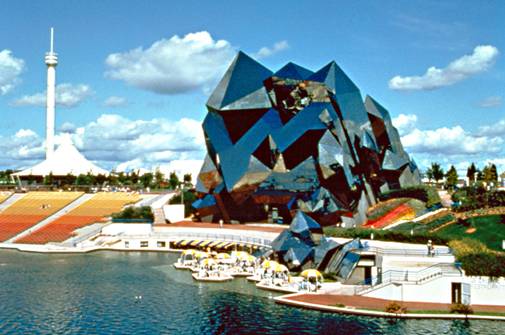
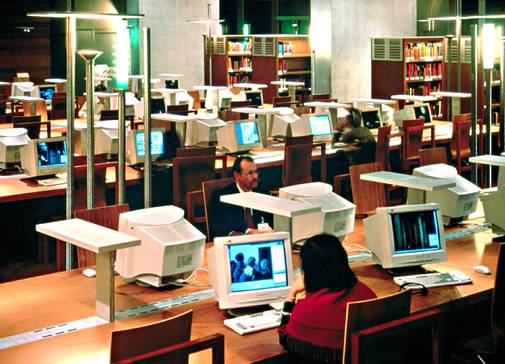
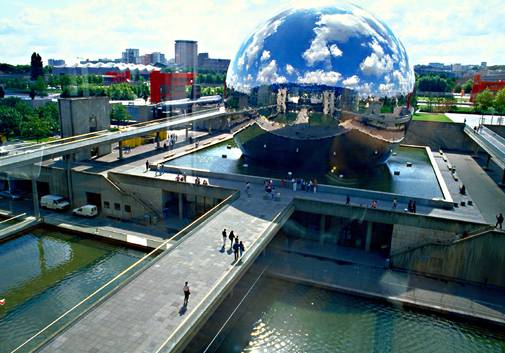
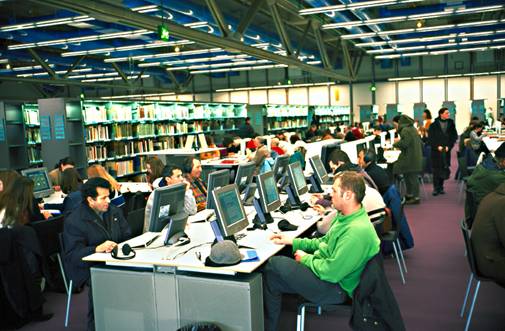
Science park in Poitiers (Futuroscope/
Bibliotheque nationale, Paris/
Cite des Sciences, La Villette, Paris/
Bibliotheque, centre Pompidou, Paris
Higher Education in France is an experience quite different from
the USA. It's the European approach to education. If one goes by
looks and amenities, certainly the French universities pale by comparison
with American universities. French academia has no interest
in high prestige sports teams, the emphasis is strictly on academic matter
and research. The French has the bibliotheque Nationale (e.g lib of Congress
) easily accessible and it is believed that all universities carry the
same standards. French universities can be very old (they started
in the Middle Ages e.g La Sorbonne ) and have been producing
great minds. The tendency nowadays is still to consider universities as
a place for reflexion and learning first and foremost. They do not
have a vocational approach.
FRENCH
HIGHER EDUCATION
Higher education in France is world-renowned for its quality and
accessibility. Tuition and health insurance at public schools are paid
for by
the French government. Admission and promotion is through a system of
merit-based examinations. Thus, intellectually qualified students are
ensured a fair chance of pursuing their educational goals, regardless of
their
financial or social status.
France leads the European Community in welcoming foreign students to its
schools and universities, with over 120,000 guests registered in French
educational institutions.
French public and private post-secondary educational institutions are divided
into the following categories:
> Universities
> "Grandes Ecoles"
SPECIALIZED EDUCATION
> Architecture Programs
> Business Schools
> Engineering Schools
> Health Care Programs
> Journalism
> Political Studies Institutes (IEP)
> Visual and Applied Arts Programs
. 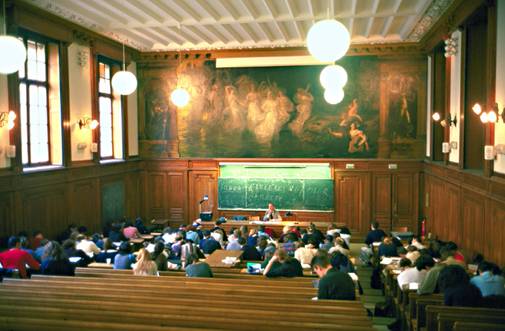
fig. Sorbonne-auditorium
UniversitiesFrench public universities aim
to give a general education of high level in all academic areas.
These are completely subsidized by the government. Registration fees for
the academic year are in the range of 750 to 4500FF(approximately
$125
to $750) in public institutions of higher education. In some cases,
additional fees to cover health insurance (sécurité sociale),
ranging from 2,500 to 5,000FF (about $430 to $860 depending on the
currency exchange rate), can also be incurred. These costs do not include
living expenses.
Degrees: 2 year degree= Diplôme d'Etudes Supérieures
BA= 3 year = Licence
MA= 4 year = Maîtrise
Ph.D= 7 years =Doctorat
fig. Ecole Normale Sup, Lyon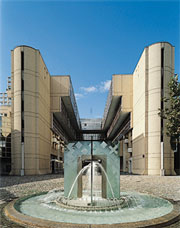
Grandes Ecoles are Institutions
in higher education that limit the
number of applicants admitted. Very competitive.
To
prepare for entrance competitions(e.g one in five gain admission ), lycee
students must enrol in preparatory classes.(2 years PREPA).
Students must sit for the competition corresponding to the stream taken
in preparatory classes: scientific, technological and economic. These
schools have a professional specialization that is not covered in universities
: Grandes Ecoles: "Ecoles Polytechniques" (Engineering
schools); Ecoles Superieures de Commerce e.g.
HEC/ESC, Bordeaux, or Lyon, Paris.... (Business Schools)note:
Business schools are funded by companies via the Chamber of Commerce.
"Ecole
Nationale d'Administration" e.g. ENA ( Public Administration Schools),
Ecoles
Normales Superieures (Higher Institutes for Education)
.
Institutions for specific studies with a more vocational
approach other than Engineering, Business, Administration (Grandes Ecoles)
Schools of Medecine (attached to universities);Health
Care Programs.
Performing Arts programs are NOT included in the university
system .
Other institutions:Visual and Applied Arts Programs
e.g.
Cinema. Music Conservatoire
of Music. National School of Fine Arts
called "les Beaux Arts"
offer Architecture Programs; Painting
etc...
There are also specialist schools for Journalism
New Trends: France is diversifying the
options for post secondary education . Europe is opening new exchange
programs between universities.
Higher education evening courses ( takes longer) for people who
work.
Programs
of the European Union: concerning education. Focus on mobility:
Erasmus/Lingua/Socrates
are european exchange programs =
enable students
of any European country to study for a year in another university of the
Union. This confirms the European commitment to the study of the other
languages of the Union.
Handout 9 --Questions :
1. At what age can little French kids start "school"?
2. What are the US equivalents of CES ? of Lycee ?
3. In class Video clip: Where was the CES Pierre Brossolette
located in the community of Nogent le Retroux? What socio-economic
group does the school attract? How does the school adapt the curriculum
to the needs of students?
-
Video clip: The CES Arsene Meunier : where do you think that this
school located? Are there differences in the curriculum of this CES?
-
What is the approach regarding special education needs in this CES ?
-
Video clip:What is the US equivalent of the LYCEE? Who is resident
(boarding school) in the LYCEE?
-
What is the innovation at the LYCEE of Nogent le Retroux to help
students face the working world?
-
What is the BAC? The BAC can be of different types. Give some examples
of specialization.
---Can you explain the fact that the BAC -artistique (plastic arts) was
created after MAY 68?
-
Extra-curricular activities: comments?
4. DO you notice some differences between the French and US secondary school
systems? e.g. programs, atmosphere in schools/in classes, community
and social activities ....Comments.
.
Reflexion to complete after reading the online articles below:
Issues in Education http://www.france.diplomatie.fr/france/gb/societe/societe09.html(under
profile/society)
Continuity and Change in the System
http://www.france.diplomatie.fr/france/gb/societe/societe10.html
Adapting Vocational Training
http://www.france.diplomatie.fr/france/gb/societe/societe13.htm
kindergarden:http://www.france.diplomatie.fr/france/gb/societe/societe11.html
Collège (CES) http://www.france.diplomatie.fr/france/gb/societe/societe11.html
Lycée http://www.france.diplomatie.fr/france/gb/societe/societe11.html
Questions:
1--Give the pro and cons of an education system that focuses
on standarized programs and national standards and exams in the primary
and secondary education system as well as imposes entrance exams and preparatory
classes for the Grandes Ecoles and for some top professional specialized
schools (e.g schools of art/ architecture)
2--. It is said (see online article: Continuity
and Change in the System) that school has a symbolic
importance for the French. What is it? Which are the principles that govern
France 's concept of education ?
3--. France devotes its largest budget to education -7.3% of GDP , also
its education system is the biggest employer, yet there were and still
are issues in education. Outline these .
4. What is the origin and purpose of the system of the higher education
institutions called the Grandes Ecoles ? Explain .
5. Vocational training : cite some of the measures that France has taken
to help the students on a non-academic track, at the secondary school level.
6. What does "secular" mean in the context of schools in France?
Can you explain ? Is this a problem for multi -culturalism
in the French classrooms is creating?
7. What ARE the ERASMUS/LINGUA PROGRAMS?
|
Study in France? http://www.edufrance.fr/
infos
for foreigners
French Cultural Services of the French Embassy:http://www.
frenchculture.org/
Further reading: "Everything about French education "sites (click
on English options)
Magazine: Label France no41 on education and the internet.http://www.france.diplomatie.fr/label_france/label.gb.html
Ministry of Education http://www.education.gouv.fr
French cultural services of Embassy: http://www.frenchculture.org/education/france/index.html
)i
EduFrance(student exchanges): www.edufrance.fr
Educnet: information technology and distance learning:www.educnet.education.fr
Distance learning center: www.cned.fr
•
Le
Rond-Point : on-line university courses:http://rond-point.org/cours
•Europedu
: promotion of European student mobility: www.sup.adc.education.fr/europedu/french/index.html
•
Télésavoirs:
topics on the internet (e.g. art) (www.canalweb.net)
•
Cyber
Papy: intergeneration on-line help (www.cyberpapy.com)
- L'Université de tous les savoirs(366 courses
on all human knowledge/interactive)(www.2000enfrance.com/sites/utls)
•
Savoir
universel : interactive writing project with writers
e.g. Furio Colombo, Umberto Eco et Jacques Le Goff, l'Académie,
(www.academie-universelle.asso.fr)
:title" Accepting diversity"





